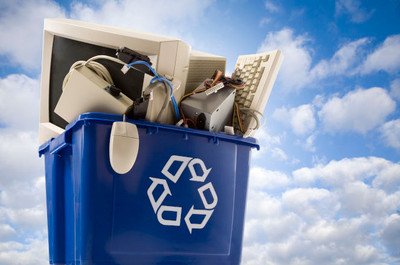Where Can I Recycle an Old Computer?
May 26th 2021
When faced with the prospect of disposing an old computer, it is important to consider both security and sustainability. Computers and laptops comprise numerous hazardous materials that, when improperly disposed, pose a threat to both general and environment health. Once a product has reached the end of its lifespan, there are three main options for moving forward with its disposition: personal resale or trade-in, donation, and recycling.
Reselling or Trade-Ins
Once a computer has outlived its usefulness, it is still possible to earn return value for the product. By opening the option for resale to local buyers, users are assured that their retired computer will remain outside of landfills, where the raw materials that make them up cannot contaminate topsoil and groundwater. Furthermore, many tech firms provide opportunities for trade-ins, in which retired hardware can be exchanged for partial payment towards an upgraded device. Remarketing an old computer extends its lifespan and protects the environment from potential pollution. If, however, a large number of computers need to be recycled, contacting e-waste recyclers to provide transfer services would prove a more efficient method.
Despite their age, old computers can still perform many of the necessary functions. Upgrading computers is generally easy and cost-effective. Replacing dilapidated hard drives with more advanced ones, or increasing RAM from 4 to 8GB, can launch a computer’s efficiency years ahead of what it previously held. Solid-State Drive upgrades, while pricey, grant unparalleled general drive speed as well as storage capacity. By implementing such upgrades, old computers can continue to be used and contribute to environmental conservation.
Donation
Donating an old computer is the most charitable option. Whether the device is still functioning or not, many organizations are eager to repurpose any hardware they can find. Sometimes, these organizations are as small-scale as local senior organizations and recreational centers, making this option both the easiest and most altruistic. In addition, some cities offer collection days for their electronics, allowing for even quicker and more targeted disposal.
Charities are not the only bodies that benefit from donations. Old computers can be upgraded significantly with relatively minor costs, and then gifted to friends or family members who may not require the high-functionality sought out by both companies and certain individuals.
Recycling
If a computer is dysfunctional or obsolete, recycling remains the most viable option. A host of organizations provide services in salvaging raw materials from retired electronics, which not only prevents their exposure to the environment, but also mitigates gas emissions in the construction of new devices. Additionally, components such as motherboards, hard drives, disk drives, RAM, graphic cards, and keyboards can be recovered for reuse. These units, as well as monitors and other segments of computers, are made of such hazardous materials as lead, mercury, and palladium. Moreover, many computers function using lithium-ion batteries, which require special transportation for recycling. As such, users should learn their battery type before beginning the process of asset disposal.
Among the other harmful materials are dioxins, an environmental pollutant, and polychlorinated biphenyls, a slow-decomposing flame-retardant that has been shown to cause cancer in some animals. Cadmium, as well, is a known carcinogen that has been shown to cause harmful effects to cardiovascular, neurological, and respiratory systems.1 Throwing a computer directly into the trash not only exposes these toxins to the environment, in some cities it can also result in hefty fines.
However, not all of the materials that comprise computers are harmful. Many of them hold value even in the public market. The EPA reported that for every million laptops recycled, the energy saved is equivalent to that used in over 3,500 US homes. For every million cell-phones recycled, 35,000 pounds of copper, 772 of silver, and 75 of gold were salvaged, the last metric equaling roughly 1.93million USD.2 In addition to these, aluminum, silicon, tin, iron, and plastic can be recovered from old computers and used in the production of new ones.
What Recycling Certifications are Important?
Not every tech firm can guarantee ethical disposal. The Sustainable Electronics Recycling International (SERI) provides certificates of compliance with R2 standards, and the E-Steward network ensures that child labor is never exploited in the disintegration of computers into their base components. Certificates from these entities verify that the company chosen to recycle old computers complies with secure and ethical modes of recycling.
What Should I Do Before I Recycle my Computer?
Before reselling, donating, or releasing an old computer to a recycling facility, users should undergo the process of Data Destruction in order to secure their information from new, unauthorized users. Data Destruction renders all data on a device unreadable, safeguarding the previous user from access to sensitive information, such as their bank statements, credit card information, and even usernames and passwords. Only the completion of this procedure can fully prepare a retired computer for resale, donation, or recycling.
Blair Tech Direct
Blair Technology Group provides not only NAID, HIPPA, and NIST-certified Data Destruction, but also guarantees that recycled equipment will only be processed downstream by companies that are R2 or E-Steward certified. We pride ourselves on transparency, tracking every asset in real time through chain-of-custody documentation, and providing easy access to a client portal that allows step-by-step supervision of the process. Finally, we are committed to sustainability, and as the US’s largest Microsoft Authorized Refurbisher, we both recycle and remarket retired computers to ensure that raw materials are always utilized in the manufacturing of new products and never end up in a landfill.

